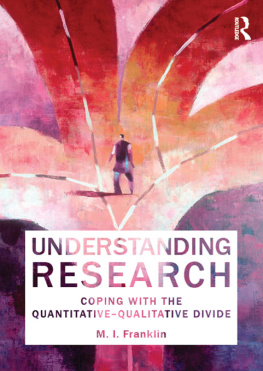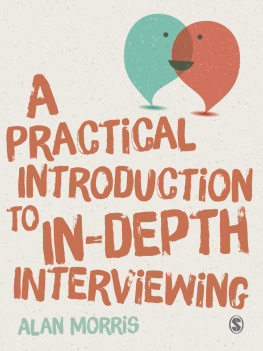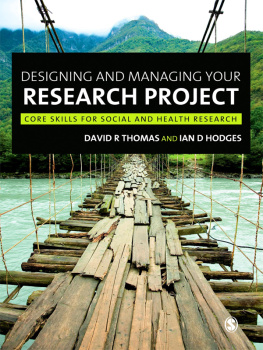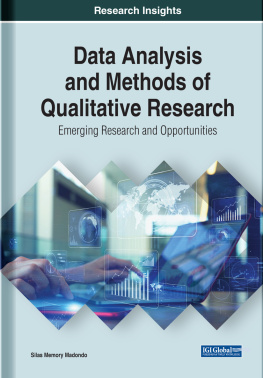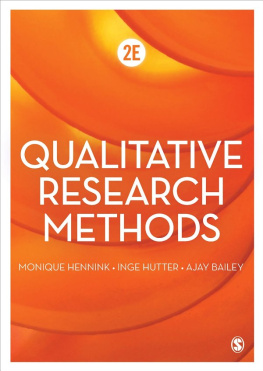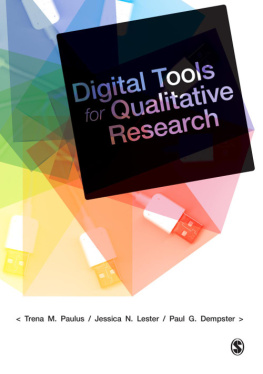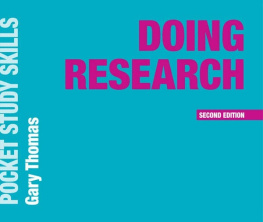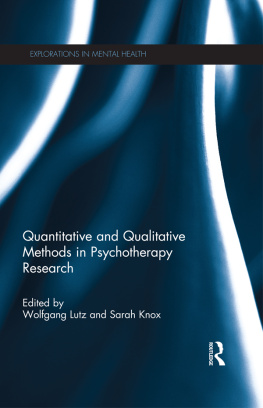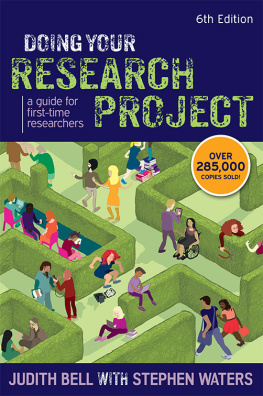Is there really no such thing as a stupid question? Maybe not. However, budding researchers quickly learn to avoid looking stupid at all costs, so leaving many questions about the research process frequently unasked. In this sense, borrowing from that erudite social commentator Woody Allen, this book could well be entitled Everything You Wanted To Know About Academic Research But Were Afraid To Ask , or afraid to answer. My first acknowledgement is to other authors in the methods and research skills literature that informs this project: Respect .
Closer to home, this book has been the product of a particular sort of collaboration. A number of people have shared with me their own experiences, wisdom, teaching material and, in some cases, let me watch them first-hand conveying some of the insights presented here; thanks to Susan Banducci, Chris Berry, Niko Besnier, Terrell Carver, Tim Crook, Matt Davies, the late Alex Fernandez, Des Freedman, Julian Henriques, Jeannette Hoffman, Jeff Karp, Harry Kunneman, Laurens ten Kate, Meryem Marzouki, Liz Moor, Hans Radder, Philippe Rekacewicz, Anne Sisson-Runyan, Richard Smith, Susan Stocker, Kent Wilkinson, and Sally Wyatt. Thanks to Pasi Vliaho, my partner in crime in developing a department-wide research module at Goldsmiths.
Others took time to read various versions of the manuscript, in whole or in part; offering concrete advice and suggestions from their own point of view, contributing examples and substantive material as well. First and foremost Id like to thank Susan Banducci for her contribution, not only for the part she played in the genesis and development of the books rationale but also her input on specific topics: the nuances of quantitative research, supervision, ways of coping, research design, and politics. Her unflinching eye as dispassionate reader of a substantial part of the manuscript early on and her generous sharing of teaching resources and her own research experience have been formative and inspiring. The wit, pragmatism, and perspicacity she has brought to our conversations about these matters over the years are also greatly appreciated. I hope that the book does justice to these ongoing discussions.
My gratitude also to Zeena Feldman, Zab Franklin, Zlatan Krajina, Marieke Riethof, and Yu-Kei Tse for their invaluable reading of the final draft; whose observations, editorial suggestions, and quizzings made a big difference just in time. A number of colleagues along with former and current research students provided an equally important input to the development of my thinking and writing. To James Curran, Nick Couldry, and David Morley my thanks for the institutional-level support for the books approach and the spirit in which it is written. My thanks to Asad Asaduzzaman, Kath Geraghty, Jowan Mahmod, and Dong-Hyun Song for raising important issues during their Ph.D. research. Thanks as well to Keith Hubbard for all those weird and wonderful web-links, and to Marcia Pacheco and Richard Mulindwa-Kavuma (M.A. cohort 2010) for their pertinent inquiries and encouraging words along the way.
To Pierre Florac, Zab Franklin, Taka Hosoda, Jochen Jacoby, David Reynolds (my lets get writing pal), Pollyanna Stokoe, Belinda Watt, and Claire Young, I am very grateful for all the on-the-hoof input, positive energy, and attention to my well-being. My gratitude to Tadgh OSullivan for his intuition and indexing services that went beyond the call of duty. And a very special thanks to all those artists who have generously allowed reproduction of their cartoons and strips for our enjoyment.
Sections in ; Franklin, M. I., 2009, Sex, Gender and Cyberspace, in Gender Matters in Global Politics: A Feminist Introduction to International Relations , Laura Shepherd (ed.), London and New York: Routledge, 32849.
Finally, I dedicate this book to all my students past, present, and future.
Without their questions, crises, disappointments, challenges, relief and satisfaction on completing their various research projects, this book would never have got off the ground let alone written.
Amsterdam
26 August 2011
PERMISSIONS AND ATTRIBUTIONS
Thanks are due to the following copyright holders for permission to reproduce their work: Nina Paley, for
Every effort has been made to contact copyright holders for their permission to reprint material in this book. The publishers would be grateful to hear from any copyright holder who is not here acknowledged and will undertake to rectify any errors or omissions in future edition of this book.
Below is a template for composing your own consent form relevant to the sort of interview and context.
CONSENT FORM FOR INTERVIEW
Thank you for agreeing to this interview. As previously discussed, these questions relate to a... in... at [institution]. The dissertation investigates...
Your responses will be treated with the appropriate levels of confidentiality, i.e. anonymous unless prior permission granted to be named; interviewees have access to the dissertation if they so choose...
The material gained from the [interviews] will be used specifically in relation to the aforementioned dissertation topic only.
Signed:...
Print name:...
Date:...
Prescriptive and proscriptive ethical duties and obligations for the academic researching of cyberspace or the internet are not significantly different to those applying to traditional qualitative and/or quantitative research in human and animal communities. There are areas of consensus about right and wrong and good and bad in relation to researching and researchers. In the UK there are also legal considerations particularly in any research concerning the process of establishing and developing human relationships online. There are also well-established research centres and journals exploring internet and cyberspace ethics and many academic institutions have publicly published their own guidelines.
NOTE
Draft Ethical Guidelines for Internet Research/Researching Cyberspace (June 15th 2010); reproduced here with kind permission from Tim Crook.
Table A2.1 Guidelines for internet research/researching cyberspace
| Internet/cyberspace | Textual analysis. Access by going online using search engines and retrieving internet page impressions without the need for registration, username and password. | Ethical obligations: Attribution, URLs, date and time retrieved/visited. Disclosure not needed in visits to web- pages, but permission for inclusion of quotations and multi- media recommended. |
| Legal risks: Indecency, anti-terrorism crimes. Breach of copyright/intellectual property laws. |
Internet communities and macro-membership networks
Large-scale, e.g. Facebook, MySpace, Friendsreunited, YouTube, Second Life. Computer games such as Fairyland and Farmville. | Textual analysis. Access by joining the large-scale network via registration, username and password. Opinion is divided on whether permission should be obtained by the companies owning these cyberspace networks prior to conducting textual analysis research or ethnographic observation. | Ethical obligations: Attribution, URLs, date and time retrieved/visited. Disclosure that registration is being made for the purposes of research is advisable. |
| Ethnographic observation without participation. Ethnographic participation. It is advisable to disclose and seek permission not only from the network gate-keepers but also from individuals and group forums that are being observed and are responding to your participation. | Legal risks: Mainly breach of copyright/intellectual property laws as issues of indecency and terrorism crimes tend to be excluded or met through the networks own pre-moderation and reporting protocols. Participant-observation must avoid the infliction or causation of emotional and/or social harm. Legal risks include communication crimes and torts such as generating racial, religious, or gender orientation hatred, defamation and breach of privacy. |

